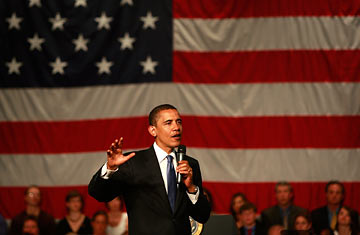
President Barack Obama addresses health-care issues during a town-hall-style meeting in Green Bay, Wis.
If Barack Obama's town hall Thursday had all the feel of one of his 2008 election rallies — there he was, standing in front of thousands of supporters in a flag-draped high school gym in a swing state — well, that was really the point. The President journeyed to Green Bay, Wis., to lend his popularity to the cause of health-care reform, hoping to bring to bear all the campaign skills that got him to the White House in the first place.
"As Congress moves forward on health-care legislation in the coming weeks, there are going to be different ideas and disagreements about how to achieve this goal. And I welcome all ideas. We've got to have a good debate," he declared. "What I will not welcome, what I will not accept, is endless delay or a denial that reform needs to happen." As Obama's comments suggested, he is leaving it to the lawmakers, the lobbyists and the interest groups back in Washington to work out the gritty details of how to "fix what's broken" and "build on what works." His job, as he sees it, is to "make the case," said White House spokeswoman Linda Douglass.
To do that, Obama is also relying on many of the high-tech grass-roots organizing techniques that worked so well for his presidential campaign. Last weekend the Organizing for America operation that was spun off from his campaign organization held health-care-reform house parties around the country. On Wednesday, the Democratic National Committee launched a new website that it calls the Health Care Action Center. It has tools to help supporters to organize and to share their personal health-care stories, as well as to write letters to editors and contact congressional representatives.
Of course, the inconvenient difference between campaigning and governing is that the latter requires actual choices and compromise. In the case of health-care reform, Obama at some point will have to deal not only with conservative opposition but also with the expectations of his liberal base. Already, supporters of single-payer health care — a government-financed system similar to that of Canada or Britain — are complaining that they have been shut out of the conversation.
And even some of those who support the overall effort aren't entirely sold on some of the particulars. Take the meeting that White House health czar Nancy-Ann DeParle and Health and Human Services Secretary Kathleen Sebelius held earlier this week with leaders of groups that represent minorities, the disabled and the disadvantaged. While these are the very segments of society that stand to benefit the most from expanding health coverage to the 47 million or so Americans who currently lack it, they were nonetheless skeptical of some of the things that Obama is trying to do.
Some, for instance, said they are wary of comparative-effectiveness research — the gathering of data that would show which treatments and drugs work best (and, presumably, therefore are most worth paying for). Many of what turned out to be breakthrough AIDS drugs did not look that way when they were first tried, said Rebecca Fox, executive director of the National Coalition for LGBT (lesbian, gay, bisexual and transgender) Health. "There needs to be time to show that these things are effective — especially for populations that aren't used to getting research funds."
What is different from previous health-care-reform efforts (like Bill Clinton's) has been Obama's skill — so far — at keeping potential adversaries at the table. But at a certain point, the President won't be able to remain so (deliberately) vague about what he wants to see in the final product, and the details of the plan will very much determine whether potential opponents will support him in the end. Nowhere is that clearer than on the controversial question of whether the health-care-reform scheme will include a "public option," which would give people the choice of being covered under a government-financed program. On Thursday, the American Medical Association (AMA) said that while it is willing to consider a public plan under some circumstances, it "opposes any public plan that forces physicians to participate, expands the fiscally challenged Medicare program or pays Medicare rates." In other words, it will insist upon a public plan that is far weaker than many liberals would like to see.
The AMA, which is the nation's leading physicians organization, is not the political force that it once was, but its opposition could nonetheless complicate the push for overall reform. So as much as Obama is trying to stay with broad campaign themes emphasizing the larger need for health-care reform, he's also going to have to spell out more clearly where he stands on some of its tougher questions. In fact, that kind of reckoning may come as early as Monday, when he reaches the next stop on his health-care campaign trail — a speech at the AMA's 158th annual meeting in Chicago.
